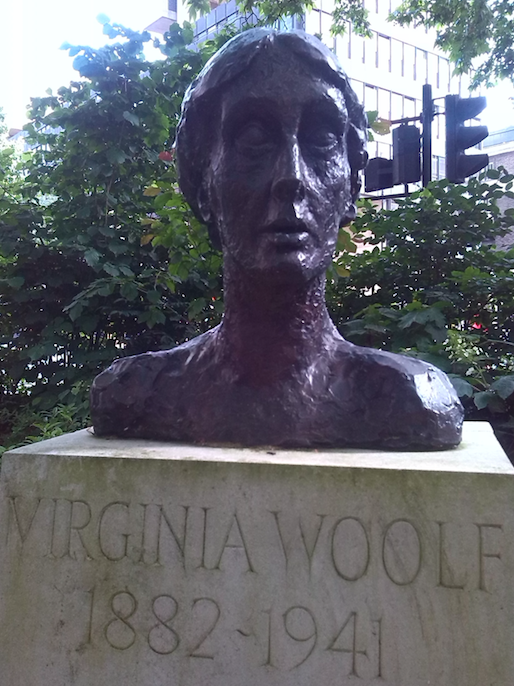
In Virginia Woolf's 1929 essay, A Room of One's Own, Woolf noted,
"For most of history, Anonymous was a woman".
Her essay was based on a series of lectures delivered the previous year at Newnham College and Girton College - two women's colleges of the University of Cambridge, England.
The issue of anonymity - and pseudonymity (use of a pen name) - is a very relevant one in relation to my own work. I published The History & Arts of the Dominatrix under an author pseudonym of Anne O Nomis, a word-play on "Anonymous".
In doing so, I was following in a long history of female authors that chose to use a nom de plume - a pen name - rather than their "real" name.
Jane Austen is one of the most noteworthy of the 19th Century women to publish anonymously. Beginning with 'Sense and Sensibility' in 1811, with the cover page listing the author only as 'BY A LADY'.

The Brontë sisters, afraid of their work being judged differently it was revealed they were women, chose to use male pen names for their work, with a book of poems with the names Currer Bell, Ellis Bell and Acton Bell.
Charlotte Brontë published her works (including her well known novel Jane Eyre, 1847) under the psuedonym Currer Bell. Emily Brontë published Wuthering Heights (1847) under the name of Ellis Bell. While Anne Brontë wrote Agnes Gray (1847) and The Tenant of Wildfell Hall (1948) under the name Acton Bell.
For astute readers, their choice in pen name retained the same initials - C (Charlotte --> Currer), E (Emily -->Ellis) and A (Anne--> Acton), with their last name initial B (Brontë --> Bell).
Aside from the gender considerations behind the historical use of pen names, the other relevant driver of psuedonyms has historically been by authors writing on sex.
The Victorian Memoir of a man's sexual initiation was published as My Secret Life by Walter in around 1888 and reprinted repeatedly in subsequent years. The author's real identity is often ascribed as likely being Henry Spencer Ashbee, referred to as a Victorian gentleman and erotomaniac due to his extensive collection of erotica.
Henry Spencer Ashbee did certainly write Index Librorum Prohibitorum (Index of Forbidden Books) under a psuedonym of Pisanus Fraxi. This pen name was a conglomeration of "Fraxinus" (meaning Ash) and "Apis" (meaning Bee), so cleverly referring to Ashbee's surname. While the book is a bibliography of the erotic and "forbidden books" known to Ashbee, including a section entry on Flagellation.

Above: Frontispiece with illustrations of putti whipping (top) and burning books (centre), of Index Librorum Prohibitorum by Pisanus Fraxi. The name is the psuedonym used by Victorian erotomaniac Henry Spencer Ashbee.
Story of O, one of the most famous fictional works involving BDSM, was published in 1954 under the pen name Pauline Réage. Many people believed the book could only have been written by a man. However the writer's true identity and gender was not revealed until some four decades later. At an interview with a British journalist for The Observer in 1994, an 86-year-old intellectual called Dominique Aury acknowledged herself as the author of the book. That was not to be the end of the story of psuedonymity however. As Dominique Aury was itself a psuedonym, of Anne Cécile Desclos, born 23 September 1907 in Rochefort-sur-Mer, France. She died two years later, on 26 April 1998 (at age 90) in Paris, France.
The Intimate Adventures of a London Call Girl by Belle de Jour was published in 2005, based on her web diary blog of Summer 2003 to Autumn 2004. The pen name was taken from the famous French film 'Belle de Jour' starring Catherine Deneuve. Many journalists thought the blog was written by a man, with various names (of both sexes) put forward as the likely author. However when tabloid journalists finally did get onto the correct trail towards identifying and outing the real identity of the author, (tipped off it would seem by an ex-boyfriend,) the author beat them to the punch - outing herself, as Dr Brooke Magnanti.
My own choice to use a psuedonym was driven by concern to avoid limiting my job opportunities - due to the stigma attached to the dungeon apprenticeship, work and subject of the Dominatrix as a niche within sex work. Alongside the concern for my family coming from a small town, and media interest in reporting the book.
Dr Brooke Magnanti considers that once outed it has affected her not getting jobs within her field, due to stigma around her being a former call-girl and the publicity of her book, although it cannot be proved with certainty.
It's an issue on my mind as I am currently writing a second book within the field of sexuality. This time covering some three millennia of Goddesses of sexuality, their rituals, ancient sex songs and hymns, artwork and artifacts. My new book in progress crosses into material that will be controversial to fundamentalist Christians and Jews, in dealing with God's consort Asherah and biblical passages on Lady Wisdom and the foreign adulteress, and argues 'Song of Songs' as being derived from the tradition of ritual sex songs used in Goddess cults in the Middle East, Levant and Cyprus.


Some of my claims will rile some people, clashing with their beliefs and internal shame relating to sexuality and religion. However I feel it's an important contribution to make to the field of sexuality and history, and it's a history which is largely known only to archaeologists and ancient history scholars. I've recently had a baby daughter and cancer, and it's a book I want to complete and get out / birth into the world.
So whether to publish under my pen name or real name, there are pros and cons of each. And myriad concerns, for one's own livelihood, ability to work freely, safety, academic and social reputation, credibility, family to consider... it's not an easy decision.
